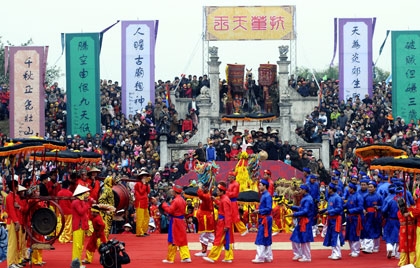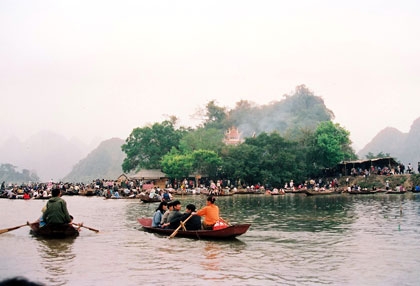Festival Tourism left in the dark
 |
Malaysia is famous for its Malaysian Colours festival, Thailand for its saturating Songkran festival, Indonesia’s traditional festivals on Bali Island are well known and Cambodia the Chol Chnam Thmay festival is a popular event for international visitors. So how about Vietnam?
Well, despite having more than 8,000 traditional festivals held annually, foreign tourists have no idea about most events but surely these festivals offer tourists one of the best ways to discover more about Vietnamese culture.
After the Tet holiday (Lunar New Year) it’s peak season for international arrivals and coincidentally traditional festivals in Vietnam.
Vietnamese people will have heard of Vieng Market festival in Nam Dinh province, the Love Duet festival in Bac Ninh province or the Lieu Doi wrestling in Ha Nam province but sadly despite these events being lively and colourful affairs there is little attention from the tourism industry.
Designing a “Festival Tour”
So is Vietnam neglecting a veritable goldmine? There are in fact some festival tours. But industry insiders lament the lack of information provided by festival organisers. Many travel companies would regard the festivals as too unprofessional and badly organised to warrant designing tours for foreign tourists.
It’s a shame as a large slice of tourists coming to Vietnam would lap up cultural events.
According to Tran Xuan Hung of V.Y.C Travel, “festival programmes do not meet our requirements” as the ceremonies are “too wordy” and the actual festivities are “too short” and “limited”.
“I am not impressed with any festival as a tourist attraction,” agrees Nguyen Van My, director of Lua Viet Travel.
Making traditional festivals more attractive for tourists would surely be a thorny affair.
“Most festivals are organised for the local pilgrims, not for tourists,” emphasises says Nguyen Duc Hy from Fiditourist.
So we shouldn’t expect too much. But would authorities from towns, villages and communes be willing to alter the appearance and style of the festival? Perhaps, but then where’s the funding going to come from? How can religious events be made commercially viable?
According to Phung Quang Thang, director of Hanoi Tourist, the demand for exploring the beauty of Vietnam’s cultural traditions is a rising trend. Many aspects of Vietnam’s rich culture are extremely alluring for foreign tourists.
“It’s just a pity that Vietnam still lacks professionalism, organisational ability and methodical promotion,” says Thang.
“We promote what we have, not what tourists need.”
Festivals add extra spice!
So when can festival tours become the extra spicy dish of Vietnam’s tourism industry?
“At traditional festivals you can discover traditional cuisine, folk games like wrestling, terra-cotta pot breaking or cockfighting, which are all very attractive to tourists but we have left these festivals in the dark due to poor promotion campaigns,” says Nguyen Cong Hoan of Hanoi RedTour.
“It’s hard to find a professional promotional campaign featuring Vietnamese festivals in any world tourism fair. So [in that regard] we can not compete with such countries in the region as Thailand, Malaysia, Singapore,” Hoan says.
Vietnam has a solid reputation for high-end tourism with a string of luxury resorts along the coast and also as a backpacker destination thanks to the cheap eats and plentiful budget accommodation options found from Phu Quoc to Sapa.
Many tourists come to relax on a beach but also to explore – the My Son ruins, the villages of hill tribes around Sapa, Cu Chi tunnels, Cao Dai Cathedral and the DMZ are some of the most commonly visited tourist sites, proving that tourists have a real interest in Vietnam’s history and culture.
Promoting festivals is surely just a matter of polishing up the product and promotion. That’s easier said than done of course and with no assistance travel companies don’t dare to sell any kind of special tour to traditional festivals.
A representative of Leem Travel claims that most of the traditional festivals are “too crowded and
disordered.”
“We are afraid festivals aren’t safe for our guests. Just a single complaint about a stolen item or poor infrastructure can tarnish the reputation of our services,” the representative disclosed. “We can offer suggestions for guests to choose a festival for themselves…”
The Huong Pagoda Festival is often used as a vivid example of the chaos that often ensues at popular Vietnamese festivals.
 |
“Foreign tourists love to enjoy the ritualistic spirit and wonderful landscapes of the site but with the vast number of pilgrims and beggars and the amount of waste dumped in the springs and along the route the experience is spoiled. It’s a loss for local tourism,” says Phung Quang Thang.
“We suggest to those who love to discover more about the traditional culture and customs of Vietnam to plan their tours before or after the festival season to ensure their safety,” says a representative from Leem Travel. “For us a traditional festival is an extra for tourists, not the main destination in itineraries.”
However, the picture is not so bleak everywhere. According to the Hue Tourism Center, during the first days of the Lunar New Year, the number of local, overseas Vietnamese and foreign tourists visiting the Heritage city increases strongly.
“The high figures of tourists coming to Hue are thanks to the attraction of our traditional festivals including Huyen Tran Temple festival and Fish Worshiping festival,” says Phan Tien Dung, director of Thua Thien-Hue provincial Culture, Sport and Tourism Department.
To make festival tours a strong point in the country tourism, all tourist experts believe authorities need to select several special festivals to focus investment and promotion on.
The success of the Hue Festival is a convincing example of what can be achieved with a concerted effort and significant investment. The biannual cultural event is something of a poster child for those who hope to develop “Festival Tourism” in Vietnam.
Vietnam has so much to offer but in regards to festivals, the country is underselling itself, and underwhelming the tourism industry.
What the stars mean:
★ Poor ★ ★ Promising ★★★ Good ★★★★ Very good ★★★★★ Exceptional
Related Contents
Latest News
More News
- Foreign fruits flood Vietnamese market (December 09, 2025 | 13:22)
- Vietnam’s fruit and vegetable exports reach $7.8 billion in first 11 months (December 05, 2025 | 13:50)
- Vietnam shapes next-generation carbon market (November 26, 2025 | 15:33)
- PM urges Ho Chi Minh City to innovate and remain Vietnam’s economic locomotive (November 26, 2025 | 15:29)
- Experts chart Vietnam's digital finance path: high hopes, high stakes (November 14, 2025 | 10:56)
- Vietnam’s seafood imports surge 30 per cent in first 10 months (November 10, 2025 | 19:35)
- Vietnam’s durian exports hit $1 billion milestone (October 30, 2025 | 17:41)
- Beyond borders: Sunhouse and new era of Vietnamese brands on Amazon (October 28, 2025 | 10:46)
- Record-breaking trade fair set to open in Hanoi (October 15, 2025 | 15:59)
- Timber sector seeks solutions to VAT refunds (October 14, 2025 | 18:58)

 Tag:
Tag:


















 Mobile Version
Mobile Version